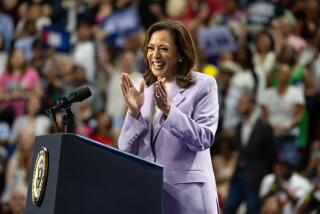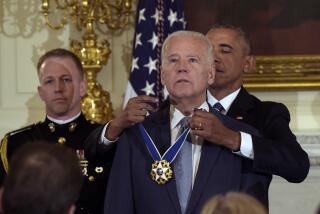As Political Heat Builds, Bush Drive Is Seen Adrift
- Share via
WASHINGTON — President Bush and his staff have entered a crucial phase of their reelection campaign more dispirited and frustrated than they have been at any point during his presidency.
Ironically, this is happening as statistics begin to raise hopes that the ailing economy is on the mend. Conventional wisdom would hold that an improving outlook is ideal for an incumbent President seeking another term.
But senior officials in the White House and outside advisers close to the President are nearly unanimous in their assessment that the mood in the White House is as low as it was in the Bush campaign four years ago, when polls showed the then-vice president badly trailing Democratic presidential nominee Michael S. Dukakis.
Back then, the Bush campaign launched an aggressive attack, managing to pull off a remarkable 180-degree turn in his political fortunes within the space of two weeks. Those closest to the campaign are hoping for another political miracle, but they admit they see no sign of one.
“There’s no creativity. There’s no energy coming out of the place. I get the impression those people have just given up,” said one longtime Bush friend and presidential adviser in an uncharacteristically pessimistic comment.
Although four years ago Bush needed but a few weeks to turn around his political fortunes, some advisers would be more comfortable if that reversal occurred sooner rather than later this time.
“The window of opportunity is very narrow,” said a former senior White House official who has maintained contacts with his colleagues. “There is a potential time bomb ticking right there.”
And some question whether Bush has a sufficient staff of hard-nosed, experienced political operatives to sweep up the shards of strategy that lie around him to rebuild his organization for one last run.
For now, Bush is trying to showcase the elements of his presidency and personality that--along with the success of the Persian Gulf War--brought him popularity ratings that neared 90% a year ago and made him seem a sure bet for reelection.
Almost daily, he recounts such exultant moments as the fall of the Berlin Wall in 1989 and the dismantling of the “Soviet empire.” But the President’s speeches also stress a domestic-policy laundry list that includes his “five pillars” of economic reform and six points of his urban renewal proposals.
The harder Bush tries, the more confounded his strategists get.
“The President has spoken more on domestic issues in the last six months, and spent more time on domestic issues, than at any other point in his presidency,” White House Chief of Staff Samuel K. Skinner said in an interview Thursday.
Still, “this has not resonated with the American people. . . . The American people haven’t gotten that message--it’s frustrating to all of us,” said Skinner, who joined the White House in December after leaving his post as secretary of transportation.
Bush himself is deeply troubled by the situation, those close to him say. “He doesn’t have a place to turn. He’s sitting there, mulling the problems through,” said the former White House official. “He’s sitting there alone.”
The President is said to have voiced that concern earlier this week when he asked aides why no one around him had come up with a strategy to undercut the popular support that is building around Texas billionaire Ross Perot, who has yet to officially declare his independent candidacy.
Even as Bush fails to improve his own approval ratings, “we have a third-party campaign which hasn’t said anything about any issues and is going up in the polls. You can understand the President’s frustration,” Skinner said.
The difficulties spring from months of anxiety and unpredictability, beginning with Patrick J. Buchanan’s now-faded conservative challenge and winding up with Perot’s wild card bid. In the face of such policy challenges as the Los Angeles riots and Vice President Dan Quayle’s criticism of television character Murphy Brown’s unwed motherhood, the White House has appeared frazzled, disorganized and ineffective.
Meanwhile, Bush is getting no lift from what appears to be an economic rebound. Growth is far more anemic than normal for a recovery. “From the average American’s point of view, it’s very hard to tell the difference between that and a recession,” said Barry P. Bosworth, a Brookings Institution senior fellow who was a top economic official during the Jimmy Carter Administration.
Moreover, the staggering federal deficit has made it impossible for Washington to undertake large public works projects or other programs that have traditionally allowed politicians--justifiably or not--to claim credit for economic improvements. Instead, Bush has lurched from trying to convince the public that the downturn was merely a case of a bad consumer attitude, to making proposals that have failed to catch fire.
The recession has drawn new attention to deeper problems that were developing beneath the surface of the 1980s boom that Republicans claimed as Ronald Reagan’s crowning achievement.
“All of a sudden, people are far more aware of the extent of economic deterioration that has occurred,” Bosworth said. “It’s very sobering.”
This isn’t the way it was supposed to be. In 1980 and 1984, Reagan won election and reelection by telling the nation that if government would only get out of the way--by cutting taxes and lifting regulations--the economy would do fine. Bush won on that platform too.
Now, as voters appear to want a more activist President, the White House seems unable to comply.
It made an effort Thursday. As Bush began a three-day swing through Western states that will bring him to Los Angeles today, he proposed spending an additional $1 billion over five years to assist defense workers and military personnel who are being put out of work by the end of the Cold War.
Still, grappling with such broad and complex problems as the Los Angeles riots, he leaves the impression that he is only responding to pressures forced on him by outside events, and draws criticism from across the political spectrum.
And when he turns to the realm of foreign affairs--once his area of strength--he confronts such tragedies as Haiti and Yugoslavia rather than such successes as the collapse of communism.
White House Press Secretary Marlin Fitzwater plays down the political problems.
Overall, Fitzwater insisted, the President “feels things are going pretty well,” believing that any difficulties reflect “external” developments--specifically, the Buchanan and Perot challenges--rather than internal problems within his organizations.
Perot has forced the Bush campaign to rethink its strategy for a conventional two-candidate race. Adding to the complexity of the new equation is the fact that the Texas businessman is attracting potential voters “who were non-participants, and it is hard to judge what voting patterns he may establish,” Fitzwater said.
Thus, Republicans and Democrats alike can no longer count on states they had once viewed as their own domain, which leaves both parties facing the prospect of running serious races in all 50.
“We’re probably behind where we’d like to be in developing strategy and determining where you want to pour your advertising money, and that leads to some frustration,” Fitzwater admitted.
Another senior White House official, speaking on a guarantee of anonymity, put it more bluntly: “In a nutshell, there’s no strategy. There’s no plan to get from here to there. There are ideas about television shows (Bush) can do, or interviews, but nobody has devised a campaign plan.”
Others disagree with Fitzwater’s assertion that the problems are coming from outside the White House and campaign organizations. They say Bush is paying the price for the personnel shifts that put Skinner and several others with no longstanding ties to the President in top positions.
Bush, said a longtime friend, “needs people around him to provide perspective” when he is under political assault. He added that Bush “is not very happy with the way the White House is not operating and the way the campaign is not operating. . . . The bloom is off Skinner’s rose, and the campaign is in tough shape.”
Bush lifted the curtain just a bit on the frustration Thursday evening at a campaign fund-raising dinner in Phoenix.
“It hasn’t been much fun in the political arena lately,” he said. “We’ve been hammered out there a little bit. Somebody said that builds character. I said, I’m a little long on character, and looking forward to a change.
“But let me tell you this,” he added. “I am quietly confident about the election this fall . . . we are going to win it.”
Gerstenzang reported from Phoenix and Tumulty from Washington.
More to Read
Get the L.A. Times Politics newsletter
Deeply reported insights into legislation, politics and policy from Sacramento, Washington and beyond. In your inbox twice per week.
You may occasionally receive promotional content from the Los Angeles Times.










